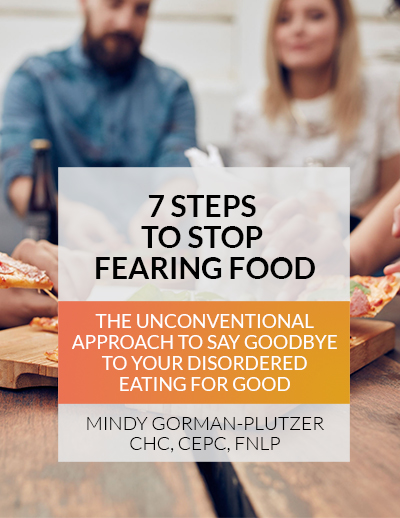Does this resonate? What does it have to do with metabolism? Are you thinking that your genes or your age negatively impact how well you metabolize your food? Is it possible that you could create a more efficient metabolism by re-framing your thoughts? Read on…
Marc David, the founder of the Institute for the Psychology of Eating, teaches it’s naïve to think that we should be able to simply stop eating our usual amount of food, or to easily begin eating a higher quality of food, without an emotional connection to the behavior being changed. If this was easy, I wouldn’t get to do the work I love, because no one would have the challenges with food and body. The reality is that the solution is not as easy as “Eat this, Not that”.
When I meet with clients it is usually assumed that I will lay out a food plan with a directive on what and when she or he should eat. Often my clients are surprised when the focus of our sessions is more about WHO they are as eaters. Part of the why and how of our eating pattern relies on the belief system we’ve developed around food. The conversation becomes about increasing awareness of how these beliefs create thoughts (both positive and negative) that contribute to the effectiveness of our metabolism, digestion, physiology and overall well-being.
Yes, it’s our relationship with food that has the greatest impact on our metabolism. In other words, what we think about food can be as impactful on its nutritional value and its effect on body weight as the actual nutrients themselves.
Sound crazy? Here’s the science behind it:
How Your Brain Eats
As Marc explains, the information highway of brain, spinal cord, and nerves is like a telephone system through which your mind communicates with your digestive organs. Let’s say you’re about to eat an ice cream cone. The idea and image of that ice cream occurs in the higher center of the brain – the cerebral cortex. From there, information is relayed electrochemically to the limbic system, which is considered the “middle” portion of the brain. The limbic system regulates emotions and key physiological functions such as hunger, thirst, temperature, sex drive, heart rate, and blood pressure. Within the limbic system is a pea-sized collection of tissues known as the hypothalamus, which integrates the activities of the mind with the biology of the body. In other words, it takes sensory, emotional, and thought input and converts this information into physiological responses. This is nothing short of fascinating.
If the ice cream is your favorite flavor – (mine is chocolate chip) – and you consume it with a full measure of delight, the hypothalamus will modulate this positive input by sending activation signals via parasympathetic nerve fibers to the salivary glands, esophagus, stomach, intestines, pancreas, liver, and gallbladder. Digestion will be stimulated and you’ll have a fuller metabolic breakdown of the ice cream while burning its calories more efficiently.
If you’re feeling guilty about eating the ice cream or judging yourself for eating it, the hypothalamus will take this negative input and send signals down the sympathetic fibers (activating a stress response) of the autonomic nervous system. This inhibits the digestive organs, which means you’ll be eating your ice cream but not fully metabolizing it. It may stay in your digestive system longer, which can diminish your population of healthy gut bacteria and increase the release of toxic by-products into the bloodstream. Furthermore, inhibitory signals in the nervous system can decrease your calorie-burning efficiency via increased insulin and cortisol, which would cause you to store more of your guilt-infused ice cream as body fat. So the thoughts you think about the food you eat instantly become reality in your body via the central nervous system.
The body doesn’t distinguish between a threat (stressor) that is real or imagined. Any guilt about food, shame about the body, or judgment about health are considered stressors by the brain and are immediately transduced into their electrochemical equivalents in the body. You could eat the healthiest meal on the planet, but if you’re thinking toxic thoughts efficiency of your digestion goes down and your fat storage metabolism can go up. Likewise, you could be eating a nutritionally challenged meal, but if your head and heart are in the right place, the nutritive power of your food will be increased.
So if the power of the mind is strong enough to impact digestion and metabolism, what do you think happens when we think to ourselves “This cake is fattening, I really shouldn’t be eating it,” or “I’m going to eat this fried chicken but I know it’s bad for me,” or “I enjoy eating my salad because it’s really healthy?”
Certainly, Marc nor I are saying we can eat poison without any harm if we believe it’s good for us. We’re suggesting that what we believe about any substance we consume can powerfully influence how it affects the body. Every day, millions of people eat and drink while thinking strong and convincing thoughts about their meal.
Can you see the importance of your thoughts, feelings and beliefs when it comes to metabolizing a meal? Are you ready to bring your happier and more relaxed self to the table?
Let’s continue this conversation! Reply to this email and share how this resonates with you. Want to know WHO YOU ARE AS AN EATER? Take my quiz at https://thefreedompromise.com/take-the-quiz/. You CAN Be the Change, Live the Change, See the Change






I’ve been browsing online more than three hours nowadays,
yet I never found any attention-grabbing article like
yours. It’s beautiful value sufficient for me. Personally, if all webmasters and bloggers made just right content material as you did, the internet will likely be
much more useful than ever before.
Thank you so very much for your comment – I hope I can be of continued support to you. Please feel free to contact me.
https://waterfallmagazine.com
This is a topic that is close to my heart…
Thank you! Where are your contact details though?
Hello!
Thank you for your comments. You can reach me – [email protected].